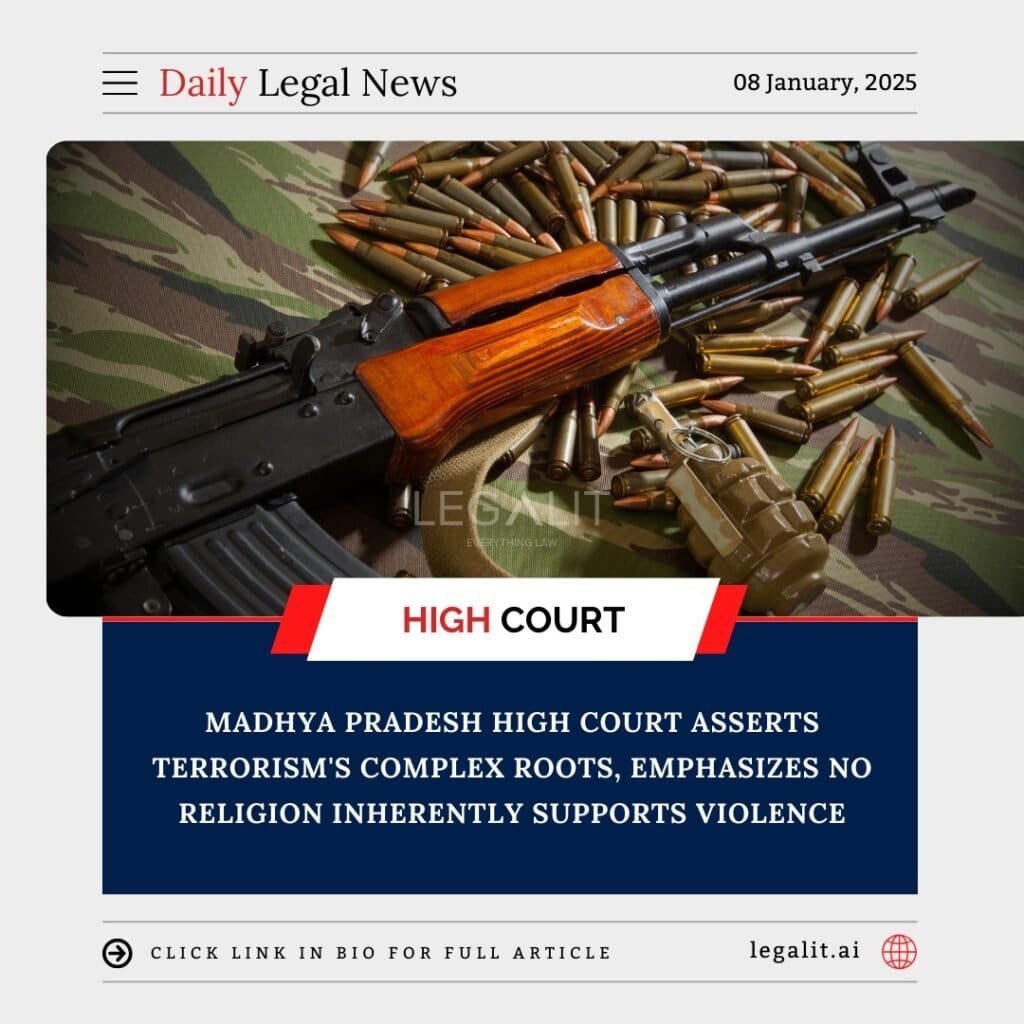
In a landmark statement, the Madhya Pradesh High Court recently addressed the issue of terrorism, asserting that its roots are far more complex than commonly perceived. The court highlighted that no religion inherently supports violence, emphasizing that terrorism cannot be attributed to any single ideology or faith. This statement is significant as it counters narratives that link religious doctrines directly to acts of terror and violence, underscoring the broader sociopolitical factors at play.
Background of the Case
The case came before the Madhya Pradesh High Court in the context of a review of terrorism-related charges against certain individuals. The accused were allegedly involved in planning or executing acts of terror, which were believed to be driven by extremist views. As the case unfolded, the court was prompted to discuss the broader issue of terrorism and its origins.
In its observations, the court examined the often-repeated notion that terrorism stems from particular religious ideologies. It noted that the roots of terrorism are multifaceted, involving political, economic, and social factors, rather than any inherent connection to religious beliefs. The court’s statement serves as a reminder that the actions of a few individuals or groups should not be used to stigmatize entire communities or religions.
The Court’s Rationale
The Madhya Pradesh High Court emphasized that while certain terrorist groups may claim religious justification for their actions, these acts of violence are not endorsed by the teachings of any major religion. The court stressed that religions around the world advocate peace and harmony, with their core principles often in direct contrast to acts of terror.
The court also pointed out the need for a nuanced approach to understanding terrorism, which involves not only ideological but also geopolitical and socio-economic factors. It mentioned that political motivations, economic disparities, and social alienation often play a significant role in fostering an environment conducive to radicalization and violence.
This statement reflects a deeper understanding of the phenomenon of terrorism, urging authorities to look beyond simplistic explanations and focus on the broader systemic issues that allow extremist ideologies to flourish.
Implications of the Ruling
1. Challenging Stereotypes and Generalizations
The court’s assertion challenges common stereotypes that associate terrorism with specific religions. By distancing acts of violence from religious teachings, the court sends a strong message against the stigmatization of entire religious communities. It reinforces the idea that individuals or groups engaged in terrorism do not represent the larger religious or cultural identity they claim to belong to.
2. Promoting Tolerance and Understanding
The ruling advocates for a more inclusive and tolerant approach to religion and society. It emphasizes that peace, respect for human rights, and understanding across religious and cultural lines are essential in combating terrorism. This perspective may foster a more empathetic approach in addressing issues of radicalization and extremism.
3. Broadening the Scope of Anti-Terrorism Efforts
By recognizing the complex nature of terrorism, the court’s ruling suggests that anti-terrorism efforts should be comprehensive and multifaceted. Rather than focusing solely on religious extremism, policymakers and law enforcement agencies should also address the social, political, and economic factors that contribute to radicalization and terrorist activities.
Conclusion
The Madhya Pradesh High Court’s remarks on terrorism emphasize that the roots of such violence are complex and cannot be attributed to any one religion. The ruling challenges simplistic interpretations of terrorism and calls for a more nuanced understanding that takes into account the broader socio-political landscape. This perspective encourages a shift towards promoting peace, understanding, and tolerance, both within religious communities and in the wider society. As the case continues, the implications of this ruling could influence future judicial approaches to terrorism and radicalization.